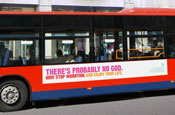The intention is to counteract what the organisation views as an increase in religious advertising by running its own posters proclaiming 'There's probably no God. Now stop worrying and enjoy your life'.
The aim was initially to raise £5500 by the year-end, which prominent atheist Richard Dawkins agreed to match. By the end of its first day, however, it had raised more than £50,000, and at the time of writing, the total had exceeded £100,000.
The religious advertising sector is undoubtedly expanding. Nigel Tedford, founder and managing director of religious marketing agency Sovereign, estimates it has grown by a staggering 2500%-5000% in the past 10 years.
One of the most prominent advertisers therein is The Alpha Course, which operates Christianity classes. It runs posters on billboards, buses, railway stations and the Underground, which tantalise passers-by with questions such as 'If God did exist, what would you ask?'
According to Mark Elsdon-Dew, The Alpha Course's communications director, its donor-funded campaigns are successful. A recent poll by the organisation found 24% of people recognised Alpha as a Christian course.
The Church of England (CoE) takes a more grass-roots approach, rarely paying for advertising. It recently ran an extensive campaign entitled 'Back to church Sunday', whereby regular churchgoers were asked to distribute cards to friends and neighbours, inviting them to attend church. The drive also involved more unusual activity, such as ads in football-match programmes that read, 'Because Jesus has taken the penalty, you can be saved'.
According to the C of E, directly after the campaign, an estimated 6000 non-regular church-goers attended a service, 600 to 700 of whom have since become regular attendees.
The BHA's director of education and public affairs, Andrew Copson, claims the catalyst for its recent activity was a 'big bus' campaign run this summer by JesusSaid.org. The BHA objected to content on the organisation's website, to which its ads carried a push. Controversial text on the site read: 'God's wrath includes the prospect of eternal punishment... You will be condemned to everlasting separation from God and then you spend all eternity in torment in Hell.'
Such rhetoric is undoubtedly a thorny issue, although all outdoor ads have to comply with Advertising Standards Authority (ASA) codes. Tim Bleakley, director of sales and marketing at CBS Outdoor, across whose sites the campaign ran, explains, the decision to run such ads is 'made on commercial terms, as long as the copy does not breach UK standards'.
The ASA received five complaints about the JesusSaid ads, but did not ban them, as the complaints were aimed specifically at the website, which falls outside its remit.
When it comes to Christian reaction to the BHA's acitivity, Paul Woolley, director of Christian think tank Theos, says he finds the ads' use of the word 'probably' surprising, when, according to him, the atheist belief is absolute. 'Richard Dawkins is far more fundamental and emphatic,' he adds.
Surprisingly, many Christian groups have welcomed the BHA campaign. Theos has even donated to it, because, Woolley says: 'It's a brilliant way to encourage people to think about God. This wasn't the BHA's aim, but it is what we're here to do.'


